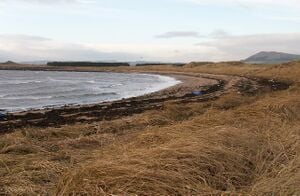This article is an offshoot of our Ecological restoration Scotland page and focuses on community led rewilding or initiatives involving local communities.

 Rewilding Nation declaration call for Scotland as Charter launched, scotlandbigpicture.com (Mar 15, 2024) — More than 2% of Scotland’s land now rewilding according to new figures
Rewilding Nation declaration call for Scotland as Charter launched, scotlandbigpicture.com (Mar 15, 2024) — More than 2% of Scotland’s land now rewilding according to new figures
Networks[edit | edit source]
- The Scottish Rewilding Alliance, collaboration between like-minded organisations who share a mission to enable rewilding at a scale new to Scotland.
- Northwoods Rewilding Network, scotlandbigpicture.com, Scotland-wide chain of landholdings committed to nature recovery and whose partners share a vision for an ecologically-restored landscape, where habitats are better connected and species can recover, expand and disperse. Page includes a map or Partners.
Organisations working with communities[edit | edit source]
The John Muir Trust (JMT) is a Scottish charity, established in 1983 to conserve wild land and wild places for the benefit of all. The Trust runs an environmental award scheme, manages several estates, mainly in the Highlands and Islands of Scotland and campaigns for better protection of wild land. In 2017, it took on a lease to manage Glenridding Common in the English Lake District.
- John Muir Trust, VIDEO: John Muir Trust channel on youtube.com
- South of Scotland Golden Eagle Project, added 15:32, 23 December 2023 (UTC)
Visions[edit | edit source]
Cairngorms Connect has a 200-year vision, to restore woodland to its natural limit, including high altitude montane woodlands; restore blanket bog and forest bogs, and restore natural processes to river floodplains. These restoration projects are intended to deliver benefits to people: reducing flood-risk, storing carbon, and providing homes for wildlife, as well as great places for people to visit. W
- "Our vision", scotlandbigpicture.com
Video[edit | edit source]
- Scotland, The Big Picture, rewilding for nature, climate and people. Video: SCOTLAND: The Big Picture on youtube.com
- Seawilding, Argyll and Bute community action
Trees for Life[edit | edit source]
Trees for Life is a registered charity working to rewild the Scottish Highlands.
The Caledonian Forest once covered a large area of the Highlands of Scotland as extensive stands of majestic Scots pine, interspersed with birch, rowan, juniper and aspen trees, but is now reduced to about 2% of its former extent. Through planting native species of trees, removing non-native species and fencing seedlings to protect them from overgrazing by deer and sheep, Trees for Life aims to help the natural regeneration of the forest. Its long-term goal is to create a fully restored, healthy ecosystem, with the reintroduction of missing species of wildlife, such as the beaver, red squirrel, and lynx.
Trees for Life work across the following key areas:
- Supporting landscape restoration.
- Reintroducing and protecting native animals.
- Helping to connect communities and people with nature.
- Enabling rewilding at scale through advocacy and partnership work.
Volunteers have helped to support Trees for Life’s work by growing and planting trees, and monitoring wildlife through their volunteering programmes. By engaging people from diverse backgrounds, Trees for Life aims to achieve a powerful and educational experience that will promote the work of nature restoration to wider audiences and lead to increased support for the return of the forest and its species.
Trees for Life value collaboration, and are engaging with communities, landowners, and businesses to ensure that people thrive alongside the expanding wild forest. Nature restoration helps to combat the challenges of the climate emergency and biodiversity crisis as nature-rich landscapes are more diverse and resilient, and help to store carbon, and reduce flooding and erosion.
- Trees for Life, Dundreggan Rewilding Centre, treesforlife.org.uk, (Highland)
Campaigns[edit | edit source]
- Rewilding Nation Charter
The Scottish Rewilding Alliance is urging people from all walks of life to sign the Rewilding Nation Charter which calls on the Scottish Government to commit to nature recovery across 30% of land and sea. Despite growing praise for its rewilding progress, more than 2% of Scotland’s land is now (Spring 2024) rewilding, Scotland remains one of the most nature-depleted countries on Earth. Scotland is ranked 212 out of 240 countries and territories for the state of its nature, and 11% of its species face extinction.
Growing numbers of communities, charities, farmers and landowners are taking action to turn Scotland’s nature crisis around – helping society cope with climate breakdown’s floods, wildlife die-offs, droughts and crop failures, while creating jobs and economic opportunities. Rewilding 30% of Scotland can be achieved by restoring wild habitats including peatlands, native woodlands, wetlands, rivers and seas, with no loss of productive farmland. Rewilding goes hand-in-hand with nature-led farming, fishing and forestry, the Alliance says. Sign via rewild.scot, Scottish Rewilding Alliance.
The campaign includes a new feature-length film called Why Not Scotland? (Official trailer above), which explores how rewilding could happen on a bigger scale in the country. The documentary is being shown on a nationwide screening tour, Spring 2024. More information, including availability for independent screenings from 1 April 2024 via scotlandbigpicture.com...[1]
News and comment[edit | edit source]
2023
 The world’s first rewilding centre has opened in Scotland, positive.news (Apr 17, 2023)
The world’s first rewilding centre has opened in Scotland, positive.news (Apr 17, 2023)
2021
Vast area of Scottish Highlands to be rewilded in ambitious 30-year project, Sep 24[2]
See also[edit | edit source]
- Topic overview: Rewilding
- UK context: Rewilding UK
References
- ↑ scotlandbigpicture.com/press-releases/, March 15, 2024
- ↑ theguardian.com








